Essays
Essays

Notes on Evil
An investigation into the current social architectures that determine the perception of the notion of "evil"... and the production of figures that embody it.
What is evil? How is it categorized, understood, and used as a tool? Surveying recent examples of "evil" which have taken hold in mass culture, Notes on Evil examines the mechanisms by which societies construct new enemies in a collective bid to rid themselves of their problems, usually culminating in largely superficial or aestheticized purges. Do societies necessarily need to create evil villains in order to function? And is the villain's role best understood as that of a court jester, who symbolically appears to mock the sovereign, while actually reinforcing their position of power?
Artist and writer Steven Warwick reflects on the overlapping social architectures which frame our current discourse on good and evil, ultimately charting a path beyond our present climate of reductivism, false binaries, and collective impasse.
Steven Warwick is a British artist, musician and writer residing in Berlin. His practice includes durational performance installations, plays and films using the construction of situations and language. He also makes music under his own name, and previously as Heatsick. His writing has appeared in Texte zur Kunst, Frieze, Urbanomic, Artforum, Spike and Electronic Beats and has co-authored a book released on Primary Information.

Faux Pas: Selected Writings and Drawings (2nd edition)
This new edition of Faux Pas, the acclaimed collection of writings by Amy Sillman, comes as an expanded edition, with the addition of new essays, including recent texts on Paul Cézanne, Carolee Schneemann, Elizabeth Murray and Louise Fishman. The previously unpublished text from a lecture on drawing complements Sillman's views on color and shape. New drawings from 2020-22 include a selection of works on paper that were part of the artist's installation at the 59th International Venice Biennale, The Milk of Dreams, in 2022.
Since the 1970s, Sillman, a beloved and key figure of the New York art scene, has developed a singular body of work that includes large-scale gestural paintings blending abstraction with representation, as well as zines and iPad animations.
Over the past decade, Sillman has also produced stimulating essays on the practice of art or the work of other artists: for example, reevaluating the work of the abstract expressionists with a queer eye; elaborating on the role of awkwardness and the body in the artistic process; and discussing in depth the role and meanings of color and shape. Featuring a foreword by Lynne Tillman, Faux Pas gathers a significant selection of Sillman's essays, reviews and lectures, accompanied by drawings, most of them made specially for the book.
Faux Pas aims at revealing the coherence and originality of Sillman's reflection, as she addresses the possibilities of art today, favoring excess over good taste, wrestling over dandyism, forms over symbols, with as much critical sense as humor.
Based in New York City, Amy Sillman (born 1955) is an artist whose work consistently combines the visceral with the intellectual. She began to study painting in the 1970s at the School of Visual Arts and she received her MFA from Bard College in 1995. Her work has been exhibited internationally, including at the Whitney Biennial in 2014 and the Venice Biennale in 2022; her writing has appeared in Bookforum and Artforum, among other publications. She is currently represented by Gladstone Gallery, New York.
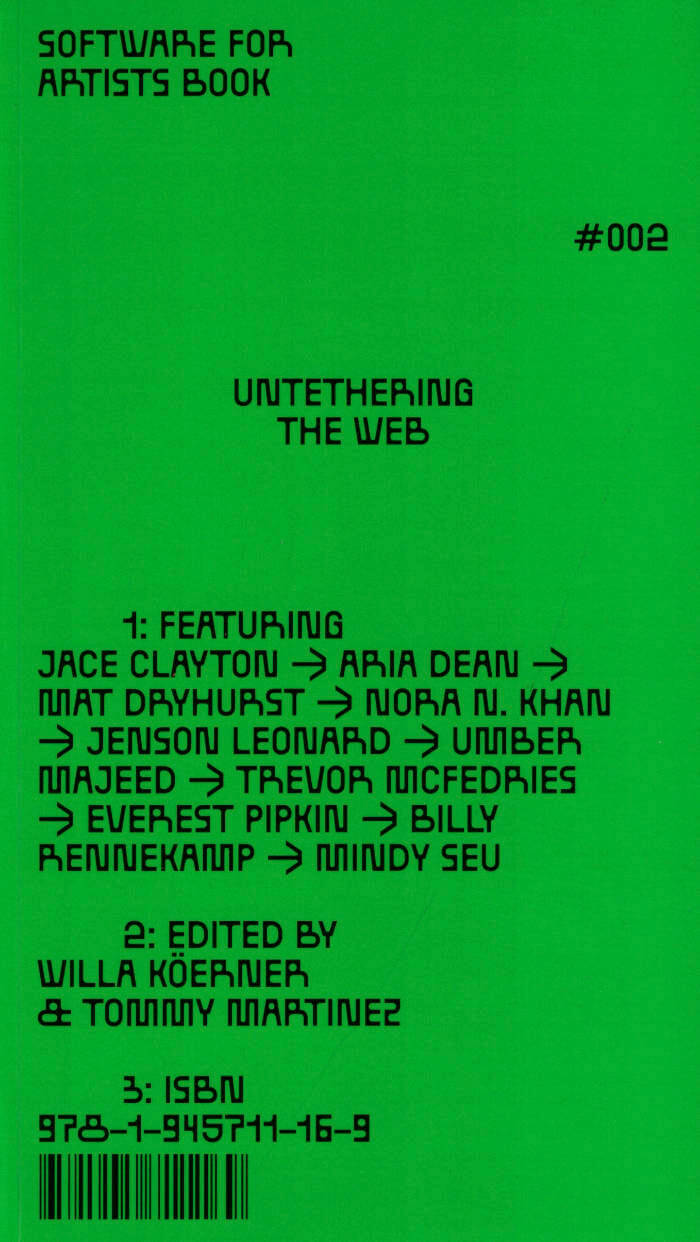
Software for Artists Book: Untethering the Web
A compendium of creative texts examining our complex and slippery relationships with new technologies.
What will the internet of the future make possible? Untethering the Web explores the technologies, strategies and anxieties that are coalescing in 2022 to shape a new digital paradigm. As naturalized citizens of today's always-online world and as survivors of a multiyear pandemic, the need to reform our digital tools and approaches is more pressing than ever before.
Evolved models for virtual convening, collective organizing and digital ownership are making this possible, and a reckoning for the platformed web and its monolithic tech giants is beginning to feel imminent—but how will it all unfold, and what new pitfalls will emerge? In conjunction with Pioneer Works' seventh Software for Artists Day, in October 2022, creators, technologists and members of our community share their visions for a flourishing digital multiverse, and how they imagine it manifesting over time.

Anarchism and Other Essays
In the 1890s and for years thereafter, America reverberated with the name of the notorious Anarchist, feminist, revolutionist, and agitator, Emma Goldberg. A Russian Jewish immigrant at the age of 17, she moved by her own efforts from seamstress in a clothing factory to internationally known radical lecturer, writer, editor, and friend of the oppressed. This book is a collection of her remarkably penetrating essays, far in advance of their time, originally published by the Mother Earth press which she founded.
In the first of these essays, Anarchism: What It Really Stands For, she says, Direct action, having proven effective along economic lines, is equally potent in the environment of the individual. In Minorities Versus Majorities she holds that social and economic well-being will result only through the non-compromising determination of intelligent minorities, and not through the mass. Other pieces deal with The Hypocrisy of Puritanism; Prisons: A Social Crime and Failure; The Psychology of Political Violence; The Drama: A Powerful Disseminator of Radical Thought; Patriotism: A Menace to Liberty; and The Tragedy of Woman's Emancipation. A biographical sketch by Hippolyte Havel precedes the essays.
Anarchism and Other Essays provides a fascinating look into revolutionary issues at the turn of the century, a prophetic view of the social and economic future, much of which we have seen take place, and above all, a glimpse into the mind of an extraordinary woman: brilliant, provocative, dedicated, passionate, and what used to be called high-minded.

Abolish the Family: A Manifesto for Care and Liberation
What would it be like to imagine a communism not just of wealth but also of care, love and belonging? Where the full range of human needs are met without depending on the fragile bubble of the nuclear family? That institution we are all supposed to believe will be there for us—even though so many books and films detail all the ways in which it fails. This is the difficult yet important terrain where Sophie Lewis ventures. Abolish the Family is a short, sharp shock to our assumptions about the good life and how to achieve it.
Sophie Lewis is a freelance writer living in Philadelphia, teaching courses for the Brooklyn Institute for Social Research. Her first book was Full Surrogacy Now: Feminism Against Family, and her essays have appeared in the New York Times, Harper's, Boston Review, n+1, the London Review of Books and Salvage. Sophie studied English, Politics, Environment and Geography at Oxford, the New School, and Manchester University, and is now an unpaid visiting scholar at the Feminist, Queer and Transgender Studies Center at the University of Pennsylvania.

Theory of the Gimmick: Aesthetic Judgment and Capitalist Form
Acclaimed critic Sianne Ngai theorizes the gimmick as an aesthetic category reflecting the fundamental laws of capitalism. Gimmicks make promises of saving labor and increasing value that we distrust but also find attractive. Exploring the use of this form, Ngai shows how its aesthetic dissatisfactions reflect deeper anxieties about capitalism.
Sianne Ngai is Andrew W. Mellon Professor of English at the University of Chicago. She is the author of Ugly Feelings and Our Aesthetic Categories: Zany, Cute, Interesting, winner of the Modern Language Association's James Russell Lowell Prize. Her work has been translated into multiple languages.

Silence: Lectures and Writings
Silence: Lectures and Writings is a book by American experimental composer John Cage (1912–1992), first published in 1961 by Wesleyan University Press. Silence is a collection of essays and lectures Cage wrote during the period from 1939 to 1961.
Most of the works are preceded by a short commentary on their origins, some have an afterword provided. Several works feature unorthodox methods of presentation and/or composition. "The Future of Music: Credo" juxtaposes paragraphs of two different texts. The text of the first part of "Composition as Process" is presented in four columns, the text of "Erik Satie" in two. "45' for a Speaker" is similar to Cage's "time length" compositions: it provides detailed instructions for the speaker as to exactly when a particular sentence or a phrase should be said. "Where Are We Going? and What Are We Doing?" is presented in several types of typeface to better reflect the concept of the lecture, which was originally presented as four tapes running simultaneously. "Indeterminacy" is a collection of various anecdotes and short stories taken from life or books Cage read: the concept is to tell one story per minute, and to achieve the speaker has to either speed up or slow down, depending on the length of the story.
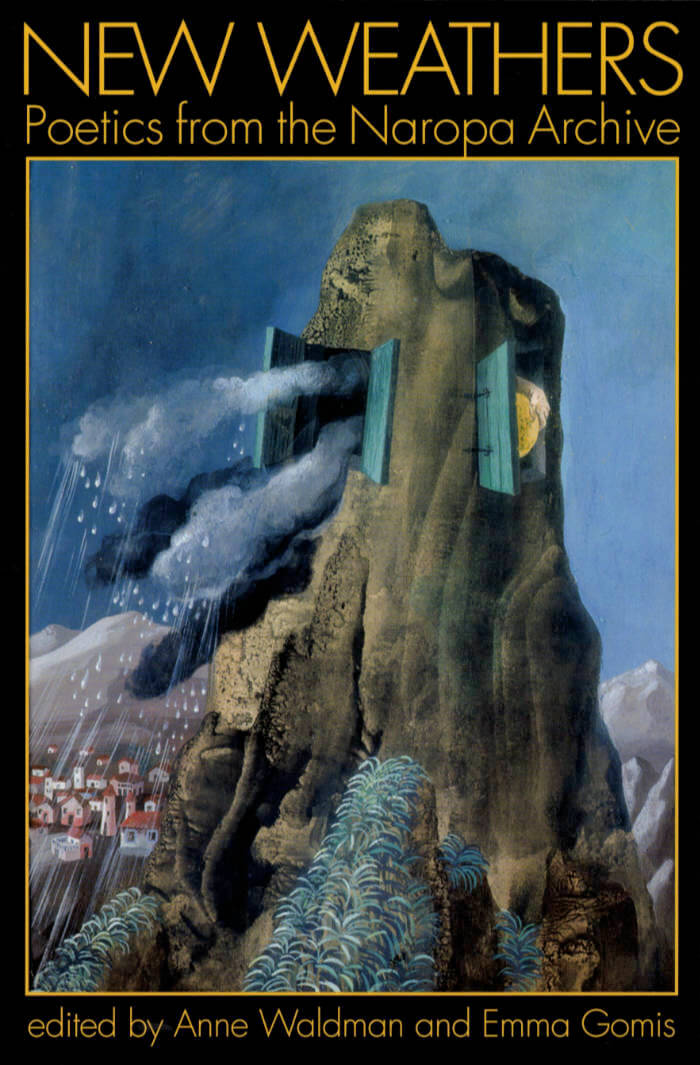
New Weathers: Poetics from the Naropa Archive: Lectures from the Naropa Archive
A collection of lectures transcribed from the audio archives of Naropa University's Summer Writing Program that represent a continuing lineage of experimental literary movements.
New Weathers asks us to consider how poetics might embolden deeper engagements with the world. Collected from the alternative education zone founded by Anne Waldman and Allen Ginsberg with the aim of opening up discourse and fostering political engagement, these texts invoke issues of gender and race-based injustice, the global climate crisis, and our possible extinction. They weave through our poetic community, the conversations we are having, the issues we are facing—our "new weathers" to posit strategies of resistance.
List of Contributors: Paula Gunn Allen, Amiri Baraka, Dan Beachy-Quick, Sherwin Bitsui, Robin Blaser, William S. Burroughs, Julie Carr, J'Lyn Chapman, Jos Charles, Jack Collom, Samuel R. Delany, kari edwards, Tongo Eisen-Martin, Tonya M. Foster, Forrest Gander, Alan Gilbert, Allen Ginsberg, Renee Gladman, Robert Glück, Lyn Hejinian, Lisa Jarnot, Kevin Killian, Thurston Moore, Fred Moten, Eileen Myles, Hoa Nguyen, Alice Notley, Akilah Oliver, M. NourbeSe Philip, Margaret Randall, Roger Reeves, Ariana Reines, Lisa Robertson, Ed Sanders, Andrew Schelling, Cedar Sigo, Eleni Sikelianos, Harry Smith, Edwin Torres, Cecilia Vicuña, Asiya Wadud, Peter Warshall, Eliot Weinberger, Peter Lamborn Wilson, and Ronaldo V. Wilson.

Flare Out
Flare Out: Aesthetics 1966–2016 is a collection of essays by Peter Gidal that includes “Theory and Definition of Structural/Materialist Film” and other texts on metaphor, narrative, and against sexual representation.
Also discussed in their specificity are works by Samuel Beckett, Thérèse Oulton, Gerhard Richter and Andy Warhol. Throughout, Gidal’s writing attempts a political aesthetics, polemical as well as theoretical. One of the foremost experimental film-makers in Britain since the late 1960s, Peter Gidal was a central figure at the London Film-Makers’ Co-operative, and taught advanced film theory at the Royal College of Art. His previous books include Andy Warhol: Films and Paintings (1971), Understanding Beckett (1986) and Materialist Film (1989).

And Then Comes the Chorus
In the high-octane essay And Then Comes the Chorus, Jon Refsdal Moe pursues the imagination of theatre opened up by Alfred Jarry when he slipped an ‘r’ into a profanity as he exclaimed ‘Merdre!’ on stage. ‘What matters is that the words became flesh and that this flesh exploded right in the world’s face. What matters is that literature stood up at the Théâtre de l’Œuvre on December 10, 1896 and cried FUCK! and all hell broke loose and the world has never been the same since.’
Jon Refsdal Moe is a writer and dramaturg from Oslo. He has written two novels, one doctoral dissertation, several essays and a lot of criticism. He was artistic director of Black Box teater in Oslo from 2009 to 2016 and is now professor of dramaturgy at Stockholm University of the Arts.
Published by Varamo Press in the essay series Gestures
First edition November 2022
48 pages, 11.0 x 16.5 cm, sewn perfect binding
ISBN: 978-82-691492-8-9
Graphic design by Michaël Bussaer

Wittig
Figure majeure du féminisme des années 1970, icône de l'écriture et de la pensée lesbiennes, Monique Wittig reste une énigme. Tenant à la fois de l'enquête, du récit et de l'étude, ce « brouillon pour une biographie » cherche à percer son mystère et à écrire sa « vie éternelle » – sa vie vécue et celle qu'elle continue d'avoir après sa mort. Nous n'en avons pas fini avec Wittig, cela ne fait que (re)commencer.
Émilie Notéris est une travailleuse du texte. Elle a préfacé les anarchistes Voltairine de Cleyre et Emma Goldman (Femmes et anarchistes, 2014) et traduit des écoféministes (Reclaim!, 2016 ; Manifeste xénoféministe), ainsi que les militantes féministes Sarah Schulman (La gentrification des esprits, 2018) et Shulamith Firestone (Zones mortes, 2020). Elle a publié en 2020 Macronique. Les choses qui n'existent pas existent quand même (Cambourakis, coll. « Sorcières »), texte de réaction écrit entre octobre 2019 et mars 2020 qui établit un relevé des violences policières, et Alma Matériau (Paraguay), une histoire féministe de l'art.

Worms #5 'Impurity'
In this issue, Worms explores New Narrative alongside writers working today that incorporate some of it’s themes. The cover star Saidiya Hartman talks with Rhea Dillon about the limits and processes of creating stories from the archive, while Camille Roy and Dodie Bellamy give insight into New Narrative from their experiences involved in the movement. Savannah Knoop tells about their life playing the character of J.T Leroy, while Calla Henkel delves into ideas of using other people’s narratives as our own. There’s lots of gleaning, lots of stealing and lots of hard truths coming from the human body. There is poetry and fiction and all of the usual bits, as well as an experimental cut up piece demonstrating the appropriation method that Kathy Acker (via William Burroughs) used in so much of her work. Many more worms to be found in these pages.
Featuring:
Saidiya Hartman, Camille Roy, Dodie Bellamy, Lynne Tillman, Estelle Hoy, Rhea Dillon, Savannah Knoop, Lauren Fournier, Madelyne Beckles, Joanna Walsh, Anne Turyn, Cristina Morales, Calla Henkel, Jenny Zhang
Contributors:
ZARA JOAN MILLER, HAYDEE TOUITOU, NICOLE DELLA COSTA, CECILIA PAVON, VALENTINA VON KLENCKE, FEYI ADEGBITE, ALICE PLATTI, VICTORIA CAMPA, ALICE BUTLER, CLEMMIE BACHE, CAITLIN MCLOUGHLIN, JACK STUART MILLS, HONOR WEATHERALL, ARCADIA MOLINAS, AIMEE BALLINGER, WES KNOWLER, ELEANOR WANG, KATY DADACZ, OLIVE COURI, RACHEL CATTLE, ISABELLE BUCKLOW, SARAH BODRI, HOPE ROAFL, MAURA SAPPILO, JODIE HILL, JACQUELINE ENNIS COLE, MARY WATT, DELIA RAINEY.

Pleasure Activism: The Politics of Feeling Good
How do we make social justice the most pleasurable human experience? How can we awaken within ourselves desires that make it impossible to settle for anything less than a fulfilling life? Author and editor adrienne maree brown finds the answer in something she calls "pleasure activism," a politics of healing and happiness that explodes the dour myth that changing the world is just another form of work. Drawing on the black feminist tradition, she challenges us to rethink the ground rules of activism. Her mindset-altering essays are interwoven with conversations and insights from other feminist thinkers, including Audre Lorde, Joan Morgan, Cara Page, Sonya Renee Taylor, and Alexis Pauline Gumbs. Together they cover a wide array of subjects—from sex work to climate change, from race and gender to sex and drugs—building new narratives about how politics can feel good and how what feels good always has a complex politics of its own.
Building on the success of her popular Emergent Strategy, brown launches a new series of the same name with this volume, bringing readers books that explore experimental, expansive, and innovative ways to meet the challenges that face our world today. Books that find the opportunity in every crisis!
adrienne maree brown, author of Emergent Strategy and co-editor of Octavia's Brood, is a social justice facilitator focused on black liberation, a doula/healer, and a pleasure activist. She lives in Detroit.
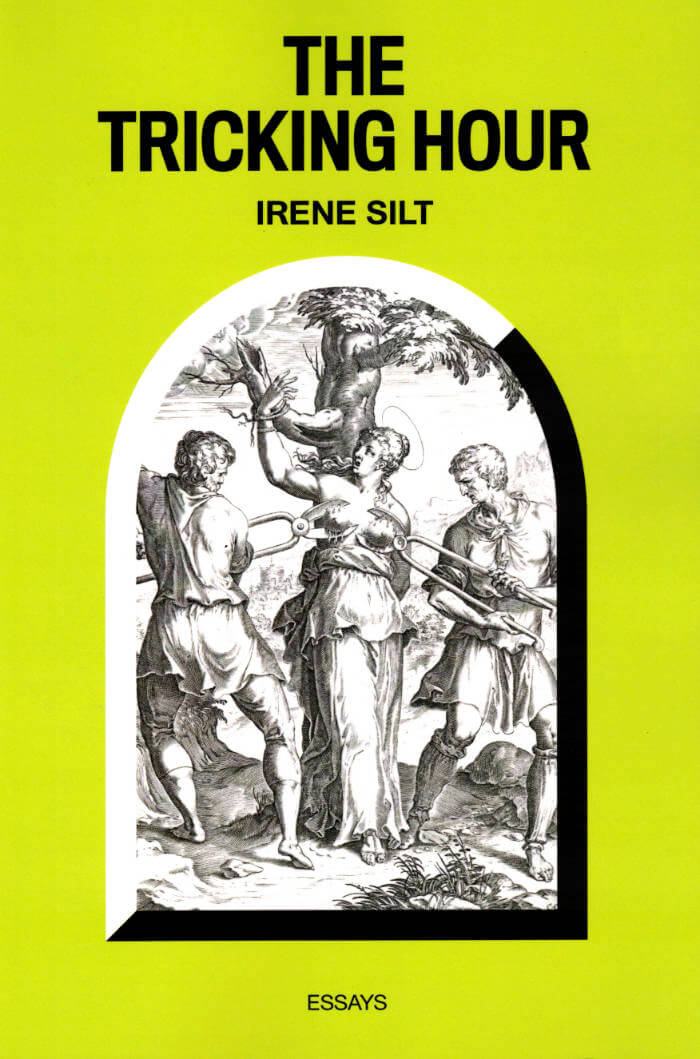
The Tricking Hour
Part anti-work polemic, part sex worker's confession, the luminous essays in The Tricking Hour envision a world organized around collective autonomy, survival, and care, instead of the compulsory exploitation of the body.
Irene Silt writes about power, anti-work feeling, joy, and deviance. Their essays and poems have been published in Mask Magazine, ANTIGRAVITY, Spoil, LESTE, Trou Noir, Poiesis Journal and in the Tripwire pamphlet series. They live in New York.

Fieldguides for a Preternaturalist 3
‘Fieldguides for a Preternaturalist’ is a series of small chapbooks designed to bring collaborators, audiences, and readers together as part of the project ‘Nothing of Importance Occurred: Recuperating a Herball for a 17th-Century Enslaved Angolan Midwife at the Cape’, initiated by South African artist Wendy Morris. Through speculative investigations of plants-as-archive and storytelling-as-method, the project focuses on retrieving a library of botanical-medicinal knowledge that perhaps informed Morris’s enslaved ancestor. The ‘Fieldguides’ invite collaborators to shed light on this from multiple angles. Joshua Cohen and Johanna Lot are the guest contributors of the third edition.
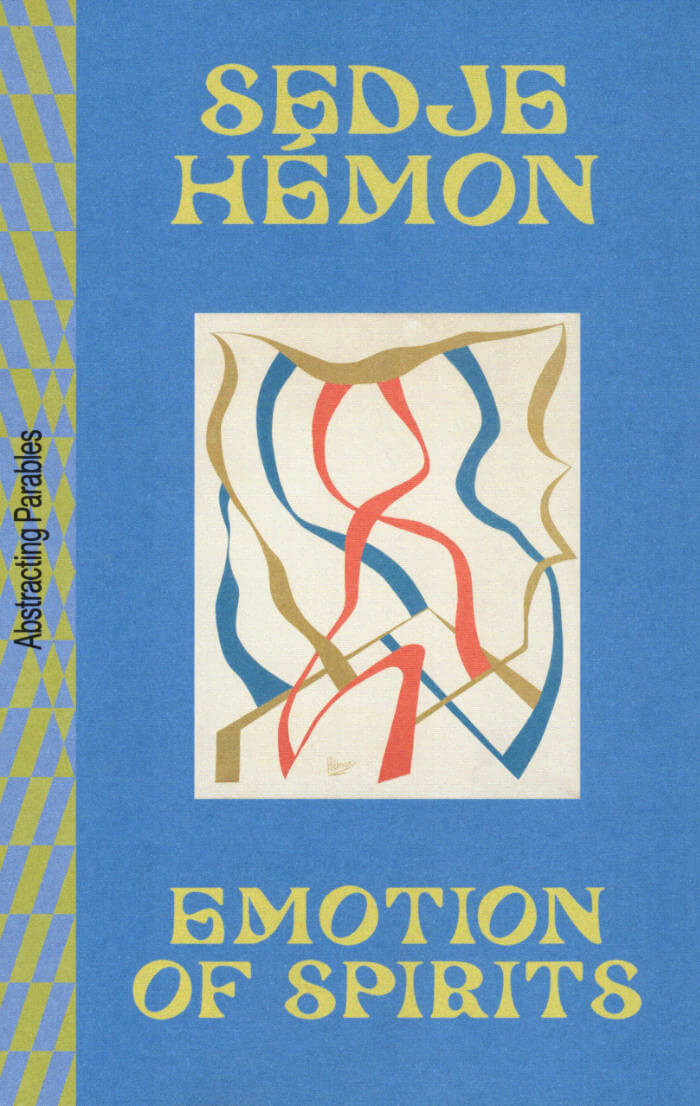
Emotion of Spirits
A panorama of the multifaceted and transversal production of Sedje Hémon, with fifteen essays.
Published on the occasion of the exhibition "Sedje Hémon. Imran Mir. Abdias Nascimento. Abstracting Parables", as part of the international Arnhem based art manifestation sonsbeek20→24, at Stedelijk Museum, Amsterdam, in 2022.
Dutch-Jewish painter and composer Sedje Hémon's (born Sedje Frank, 1923-2011) artistic practice was a deep deliberation on natural sciences, as well as an exploration of other ways of knowing. Her work was strongly influenced by her lived experience as a Shoah survivor and a member of the resistance movement. Educated as a violinist, incarceration during WWII left Hémon physically unable to play, upon which she turned her attention to painting—without ever abandoning music. During the 1950s and 1960s, she developed an intricate method for translating her paintings into musical scores. Hémon described her paintings as musical compositions, and their abstract forms are to be read as such—in relation to musical parameters such as duration, pitch, and timbre. Her visual works can actually be performed musically according to the system that she herself developed. Defiantly, Hémon worked to show the common origin and intersectionality of all arts and sciences, culminating in the development of a theory for the "integration of the arts."
Edited by Amal Alhaag, Aude Christel Mgba, Bonaventure Soh Bejeng Ndikung, Gwen Parry, Ibrahim Cissé, Krista Jantowski, Zippora Elders.
Contributions by Amal Alhaag, Bonaventure Soh Bejeng Ndikung, Ibrahim Cissé, Sophie Douala, Zippora Elders, Krista Jantowski, Aude Christel Mgba, Gwen Parry, Peter Jasper Wapperom, Elmyra van Dooren, Cannach MacBride, Siji Jabbar, Claire van Els, Marianna Maruyama, Maurice Rummens, Romy Rüegger, Jake Schneider.
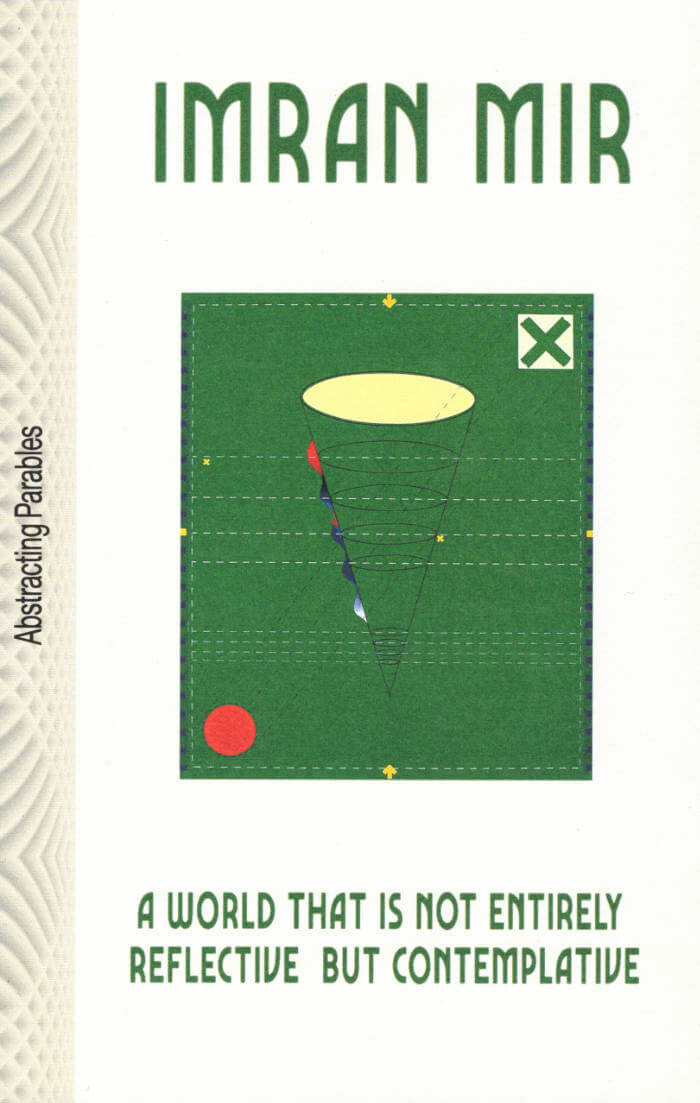
A World that is not entirely Reflective but Contemplative
A survey of Imran Mir's abstract and contemplative work, with fifteen essays.
Published on the occasion of the exhibition "Sedje Hémon. Imran Mir. Abdias Nascimento. Abstracting Parables", as part of the international Arnhem based art manifestation sonsbeek20→24, at Stedelijk Museum, Amsterdam, in 2022.
Pakistani artist, sculptor, and designer Imran Mir's (1950-2014) oeuvre can be interpreted as a constant refusal to provide comprehensive elaboration beyond what one experiences. The act of contemplation is a guiding principle to interpreting Imran Mir's work, an approach that reverberates into a practice that grew out of conversations with a community of artists, activists, poets, relatives, and other thinkers in Karachi.
Non-figurative, non-representational, geometrical and very bold, Imran Mir's works can be read as theorems and positions on multiple modernisms and abstractions. Without being a critique or a response, he played with the rules, bypassing and expanding them to other realms to explore ways of being, ways of knowing time and space outside of the confinements of the West.
Edited by Amal Alhaag, Aude Christel Mgba, Bonaventure Soh Bejeng Ndikung, Gwen Parry, Ibrahim Cissé, Krista Jantowski, Zippora Elders.
Contributions by Amal Alhaag, Bonaventure Soh Bejeng Ndikung, Ibrahim Cissé, Sophie Douala, Zippora Elders, Natasha Ginwala, Hajra Haider Karrar, Krista Jantowski, Momtaza Mehri, Aude Christel Mgba, Nighat Mir, Quddus Mirza, Gwen Parry, Nafisa Rizvi.
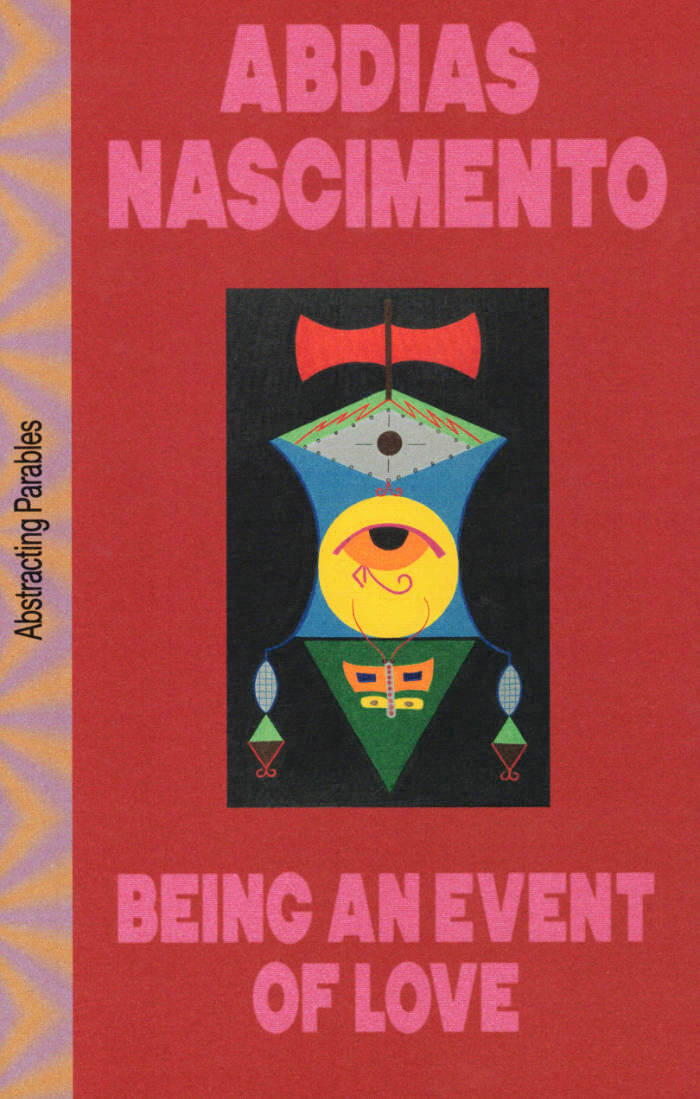
Being An Event of Love
A survey of the pictorial work of the Afro-Brazilian artist, writer and activist, with fifteen essays.
Published on the occasion of the exhibition "Sedje Hémon. Imran Mir. Abdias Nascimento. Abstracting Parables", as part of the international Arnhem based art manifestation sonsbeek20→24, at Stedelijk Museum, Amsterdam, in 2022.
The life and work of Afro-Brazilian painter, poet, essayist, dramatist, activist, and member of Parliament Abdias Nascimento (1914-2011) is a testament to his active commitment to Black expression and solidarity, both artistically and politically. Above all, Nascimento was a Pan-African activist. He organized the National Convention of Brazilian Blacks (1946) and the 1st Congress of Brazilian Blacks four years later. During the same period, he founded the Black Experimental Theater (1944) and the Black Arts Museum project (1950), both in Rio de Janeiro. While curating the latter, he began to develop his own creative work.
Edited by Amal Alhaag, Aude Christel Mgba, Bonaventure Soh Bejeng Ndikung, Gwen Parry, Ibrahim Cissé, Krista Jantowski, Zippora Elders.
Contributions by Abdias Nascimento, Bonaventure Soh Bejeng Ndikung, Shade Mary-Ann Olaoye, Amal Alhaag, Ibrahim Cissé, Sita Dickson Littlewood, Sophie Douala, Zippora Elders, Lélia González, Keyna Eleison, Krista Jantowski, Elisa Larkin Nascimento, Aude Christel Mgba, Goia Mujalli, Kabengele Munanga, Gwen Parry, Olabiyi Yai.

Verlag der Buchhandlung Walther König
Beyond Conceptual Art
Curator, writer and dealer Seth Siegelaub (1941–2013) is legendary for his promotion of Conceptual art in New York in the 1960s and ‘70s.
Acknowledging the unusual scope and essentially unclassifiable nature of his manifold interests and activities, this volume shows how Siegelaub’s projects and collections are underpinned by a deeper concern with printed matter and lists as ways of disseminating ideas. The book’s chapters explore the various facets of and connections in Siegelaub’s work, from his groundbreaking projects with Conceptual artists and his research and publications on mass media and communications theories to his interest in handwoven textiles and non-Western fabrics. It also highlights his collecting activity, which culminates in a unique ensemble of books on the social history of textiles and a textile collection comprising over 750 items from around the world. The survey also reflects on current practices through contributions by contemporary artists, such as Mario Garcia Torres and writer Alan Page, who co-created a new work inspired by Siegelaub’s bibliographic project on time and causality.
With essays by art historians and curators, a previously unpublished conversation between Siegelaub and artist Robert Horvit and an annotated chronology, this comprehensive survey pays homage to one of the most distinctive characters in 20th-century exhibition-making.

Death by Landscape
From the acclaimed author of the novel Oval comes a book of "fan nonfiction" about living and writing in the age of extinction.
In this constellation of essays, Elvia Wilk asks what kinds of narratives will help us rethink our human perspective toward Earth. The book begins as an exploration of the role of fiction today and becomes a deep interrogation of the writing process and the self.
Wilk examines creative works across time and genre in order to break down binaries between dystopia and utopia, real and imagined, self and world. She makes connections between works by such wide-ranging writers as Mark Fisher, Karen Russell, Han Kang, Doris Lessing, Anne Carson, Octavia E. Butler, Michelle Tea, Helen Phillips, Kathe Koja, Jeff and Ann VanderMeer, and Hildegard von Bingen.
What happens when research becomes personal, when the observer breaks through the glass? Through the eye of the fan, this collection delves into literal and literary world-building projects—medieval monasteries, solarpunk futures, vampire role plays, environments devoid of humans—bridging the micro and the macro and revealing how our relationship to narrative shapes our relationships to the natural world and to one another.
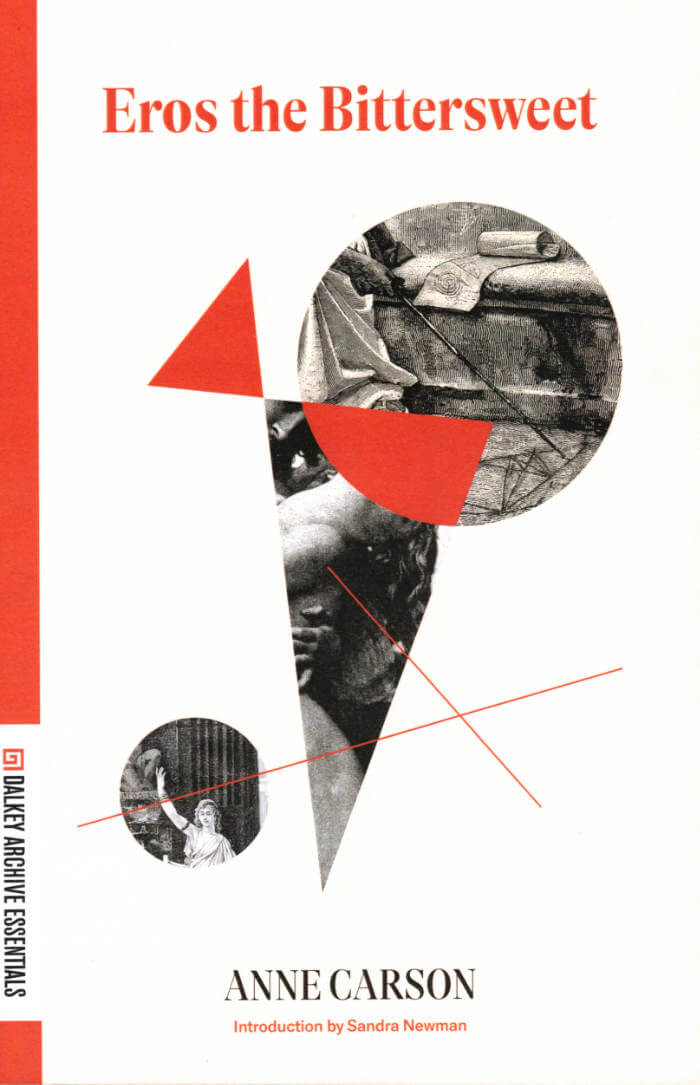
Eros the Bittersweet
A book about romantic love, Eros the Bittersweet is Anne Carson's exploration of the concept of "eros" in both classical philosophy and literature. Beginning with, "It was Sappho who first called eros 'bittersweet.' No one who has been in love disputes her," Carson examines her subject from numerous points of view, creating a lyrical meditation in the tradition of William Carlos Williams's Spring and All and William H. Gass's On Being Blue.

Blueberries
Blueberries could be described as a collection of essays, the closest term available for a book that resists classification: a blend of personal essay, polemic, prose poetry, true-crime journalism and confession that considers a fragmented life, reflecting on what it means to be a woman, a body, an artist. It is both a memoir and an interrogation of memoir. It is a new horizon in storytelling.
In crystalline prose, Savage explores the essential questions of the examined life: what is it to desire? What is it to accommodate oneself to the world? And at what cost?

After Institutions
The current crisis of museums and the future of Institutional Critique.
Faced with waning state support, declining revenue, and forced entrepreneurialism, museums have become a threatened public space. Simultaneously, they have assumed the role of institutional arbiter in issues of social justice and accountability. The canon of Institutional Critique has responded to the social embeddedness of art institutions by looking at the inner workings of such organizations. In After Institutions, Karen Archey expands the definition of Institutional Critique to develop a broader understanding of contemporary art's sociopolitical entanglements, looking beyond what cultural institutions were to what they are and what they might become.
Karen Archey is curator of contemporary art at the Stedelijk Museum Amsterdam. She is a 2015 Creative Capital | Warhol Foundation Arts Writers Grant recipient for short-form writing. Since joining the Stedelijk Museum in April 2017, Archey has organized solo exhibitions by artists Rineke Dijkstra, Stefan Tcherepnin, Catherine Christer Hennix, Steffani Jemison, Metahaven, Jeff Preiss, Charlotte Prodger, and Hito Steyerl. She has written numerous catalogue essays and is a contributor to several art publications, including Artforum and Frieze.
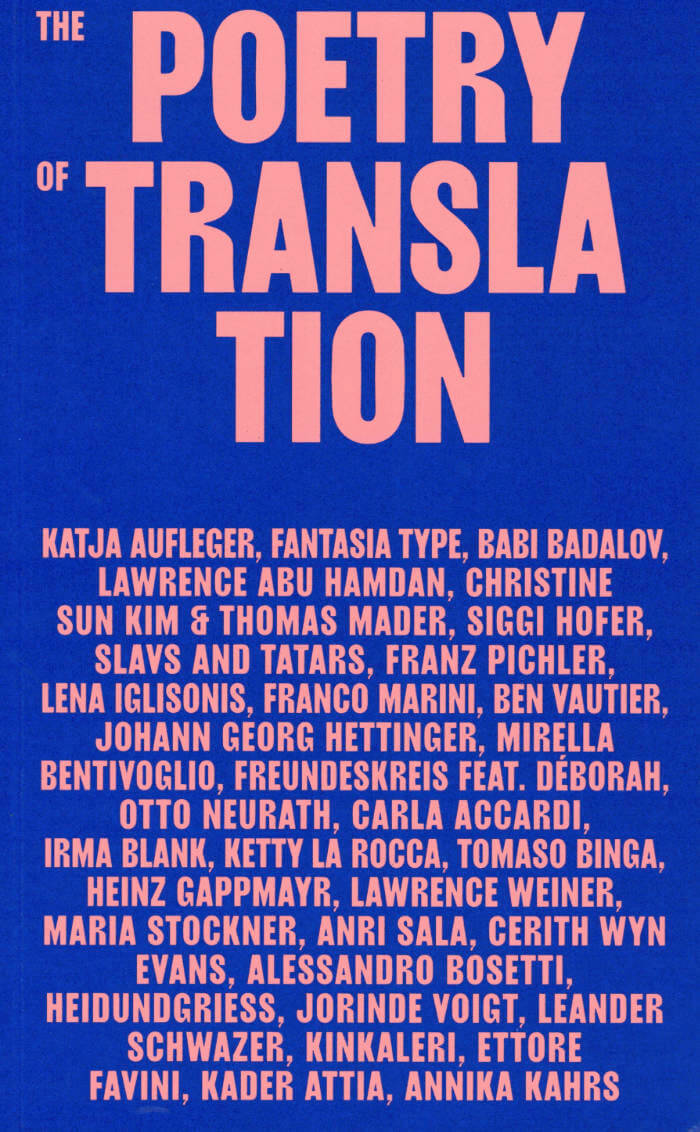
The Poetry of Translation
New perspectives on the process of translation from the works of more than thirty international artists.
"[…] what I consider to be one of the most important arts of the future: the art of translation."
—Édouard Glissant
With The Poetry of Translation, Kunst Meran Merano Arte investigates the compelling phenomenon of translation. Over seventy works by over thirty artists shed light on the process of translation from novel perspectives
Inspired by the living multilingual environment of South Tyrol and its eventful history of interethnic cohabitation, Kunst Meran Merano Arte offers the ideal context for a research on translation and questions surrounding identity, multiculturalism, and diversity. The essays and visuals included in the book address translation in its complexity: on the one hand, as a source of inclusion, international understanding, creativity, genius and poetry, while on the other as a cause of misunderstanding and exclusion. It is understood here as a creative process through which something new is always created.
Published on the occasion of the eponymous exhibition at Kunst Meran Merano Arte in 2021-2022, with Amelia Etlinger, Anna Esposito, Annika Kahrs, Anri Sala, Augusto De Campos, Babi Badalov, Ben Vautier, Carla Accardi, Cerith Wyn Evans, Christine Sun Kim & Thomas Mader, Elisabetta Gut, Ettore Favini, Franco Marini, Franz Pichler, Freundeskreis, Jorel Heid & Alexandra Griess, Heinz Gappmayr, Irma Blank, Johann Georg Hettinger, Jorinde Voigt, Kader Attia, Katja Aufleger, Ketty La Rocca, Kinkaleri, Lawrence Abu Hamdan, Lawrence Weiner, Leander Schwazer, Lena Iglisonis, Lenora De Barros, Lucia Marcucci, Maria Stockner, Marilla Battilana, Michele Galluzzo & Franziska Weitgruber, Mirella Bentivoglio, Otto Neurath, Siggi Hofer, Slavs and Tatars, Tomaso Binga.